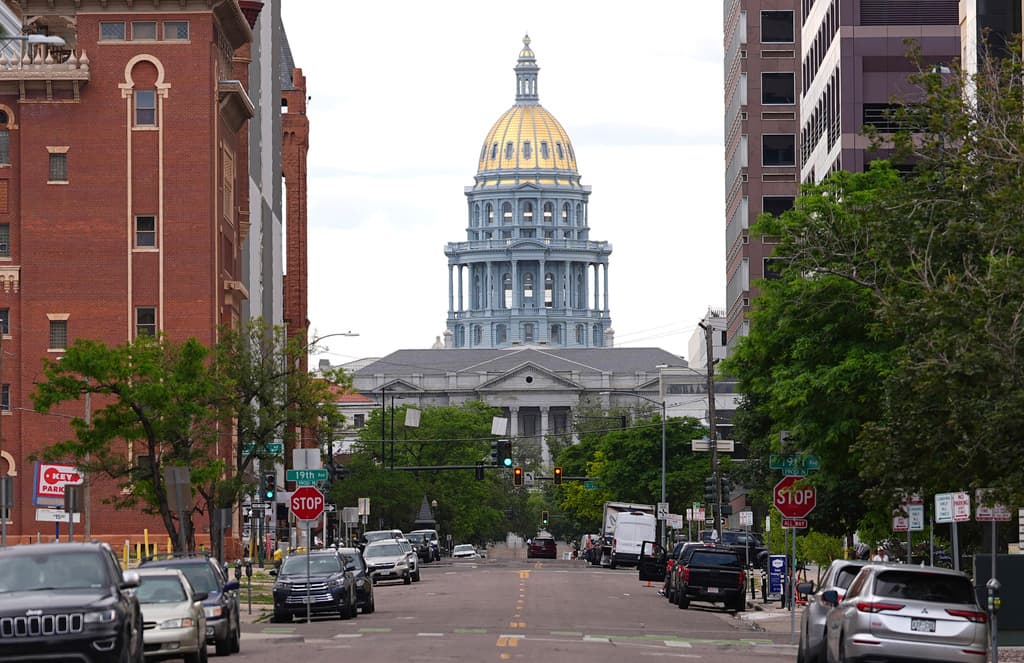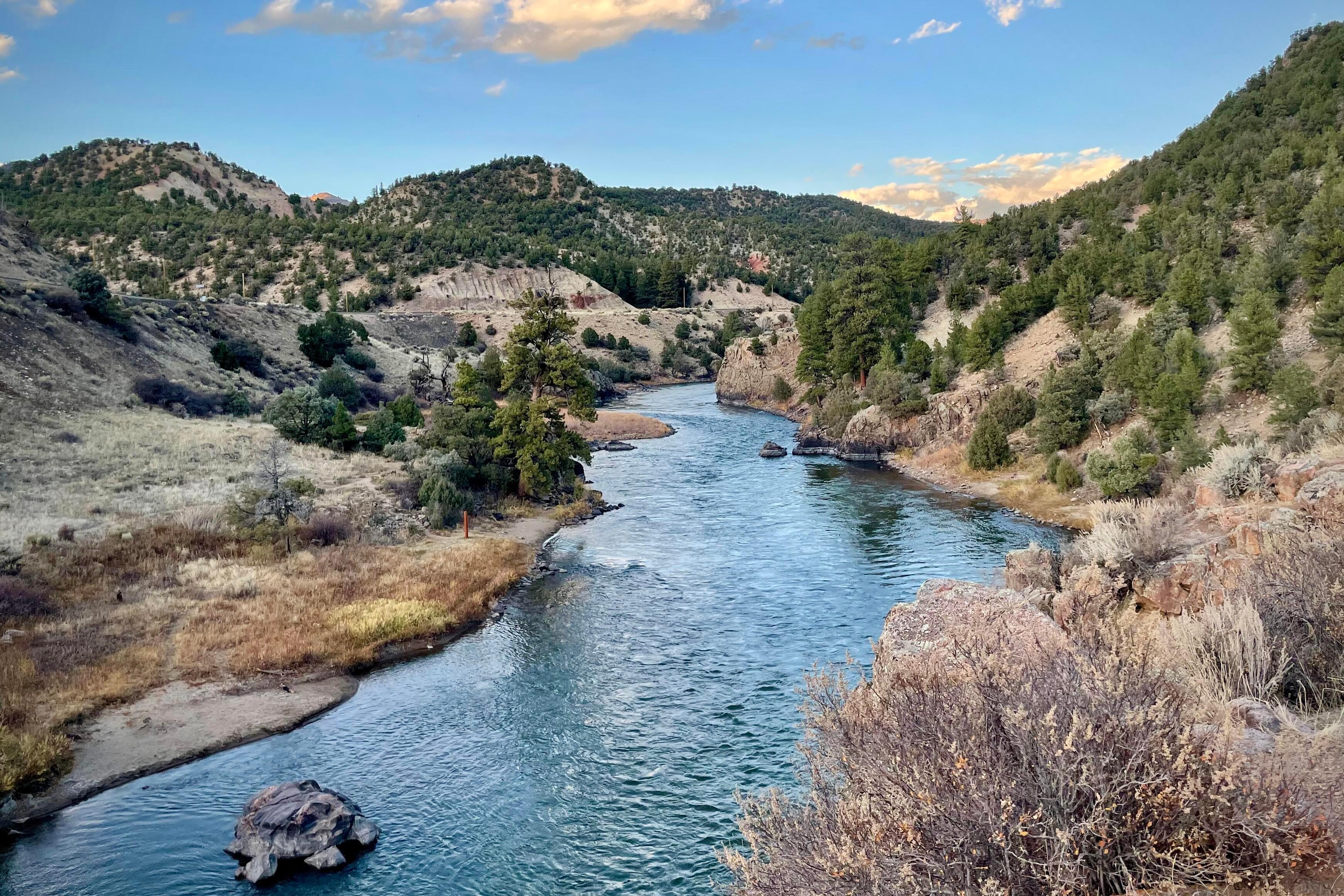
Updated at 2:24 p.m. on Wednesday, Aug. 6, 2025.
Gov. Jared Polis has formally issued a call to bring lawmakers back to the capitol starting Aug. 21 for a special legislative session to address a budget gap and the state’s first-in-the-nation AI law.
Polis is also implementing a state employee hiring freeze. Departments will leave positions unfilled in a move he said is estimated to save $3 to $7 million in the state budget.
“We'll continue to fill safety-related positions and federally funded positions. But others will go unfilled till January,” explained Polis.
While it will cover a wider range of issues, Polis said the driving reason for the special legislative session is the impact to state finances from the passage of President Donald Trump’s federal budget bill.
“Because of a single stroke of a pen — with a big bill and President Trump's signature — it costs the state $1.2 billion. And that's the entire reason. That's 100% of the reason that we now have this deficit that we need to address.”
Republicans have pushed back on that assertion, dismissing the special session as unnecessary “political theater.” They place the blame for the state’s budget woes squarely on Democrats who they say have mishandled and overspent state finances over the years they’ve been in power.
“For seven years, Colorado Democrats have held total control of the state legislature. In that time, our state budget ballooned by a staggering 50% while the state’s population has increased by less than 5%. This budget crisis comes purely as a consequence of their overspending and mismanagement. Nothing more,” said Senate Minority Leader Cleave Simpson in a statement.
Polis’ budget director, Mark Ferrandino, highlighted key budget-balancing efforts the Polis administration wants lawmakers to implement:
- Draw down 2 percent of the state reserves, to the tune of $300 million
- Change tax policies to generate between $200 to $300 million
- Cut $200 to $300 million in previously approved spending
Ferrandino said most of the tax changes would come on the business corporate side of things, such as the vendor fee, selling tax credits, and tightening up the laws around tax havens.
Specifically, these are the tax policies Polis is asking lawmakers to consider:
- Allow certain businesses to prepay their taxes, what’s known as ‘deferred tax credits’
- Decouple of the qualified business income and the Foreign-Derived Intangible Income deductions from the federal tax code
- Make adjustments and reductions to the Regional Home Office Rate Reduction and Sales Tax Vendor Fees
- Update Colorado’s list of foreign countries and jurisdictions covered by its tax haven laws
- Concerning decoupling through an add-back of the federal Foreign-Derived Intangible Income (FDII) deduction.
"On July 1, we had a balanced budget, and on July 4, we were down a billion,” said Democratic Sen. Jeff Bridges, chair of the Joint Budget Committee. “First, we cut $1.2 billion because of TABOR. Now, we're cutting $1.2 billion because of Trump. Like Yogi Berra said, it's déjà vu all over again. More importantly, every day that goes by makes it harder to fill this massive gap caused by Washington. We must act now and come back to the Capitol to make hard decisions that minimize the impact on Coloradans who depend on having a functioning state government."
However, conservative groups question the need for the state to raise new revenue in the face of changing federal tax policy.
Advance Colorado criticized Democrats for how they’ve managed the state budget in recent years. The group notes that the $1.2 billion cut the legislature is being asked to make is 3 percent of the state’s $44 billion budget.
“For too long, state officials have raised fees, overspent, and wasted funds on pet projects. Year after year, the state budget has vastly outpaced wage growth,” said Advance Colorado President Michael Fields.
The legislature may also tackle health care changes coming from the federal level. The call for a special session invites lawmakers to try to ensure Coloradans on Medicaid can continue to get services from Planned Parenthood, which the Republican budget law singled out for defunding. (That provision is currently on hold as a lawsuit works its way through the federal courts.)
“Without access to Planned Parenthood clinics, these beneficiaries could lose access to necessary care, or be forced to travel long distances to find the same care. These clinics will also lose a significant revenue source and risk closing, which will exacerbate health care shortages, especially in rural areas. This directive provides an opportunity to protect access to those providers,” said Polis in a written statement.
Polis is also asking lawmakers to see what they can do about shoring up the state’s health exchange set up under the Affordable Care Act.
He called rising costs in the exchange the first of several bad things that will happen to healthcare as a result of the Republican budget bill.
“The state can cushion it a little bit, but this is fundamentally a federal program and HR1 eliminated the tax credits that made healthcare affordable for so many Coloradans,” said Polis.
The Republican law doesn’t actively cut tax credits for people who use the exchange. Separately, Congress may allow enhanced subsidies, approved by Congress during the COVID-19 pandemic, to expire at the end of the year.
And while Democrats who control the state legislature may be fairly aligned with the Governor when it comes to his budget proposals, not everyone is on board with his request that they change the state’s AI law that goes into effect in February. Polis said he wants it to be simpler and less expensive for businesses and governments to implement the new requirements. He said it would cost the state $5 million.
“They can talk about whether they wanna delay it, whether they want to improve it, make it work better. I think there's a number of different ideas,” he told CPR News. The danger, he said, in waiting for the regular session is that it's scheduled to take effect in February, so the state would have to come up with the money.”
Polis backed an implementation delay during this year’s legislative session, but was unsuccessful. The law aims to regulate how AI is used to make decisions in key areas like banking and hiring that can greatly affect people’s lives, with the aim of ensuring the programs are not discriminatory. Backers of the policy weren’t happy to see it included in the special session call.
“Why is there, all of a sudden, a financial impact to the state, when in 2024 (when the bill was passed), there was no impact whatsoever? This seems disingenuous, especially coming from our Governor who quickly and publicly agreed with the proposed moratorium on state policies on AI,” said Democratic Rep. Brianna Titone, one of the main sponsors of the state’s AI bill.









